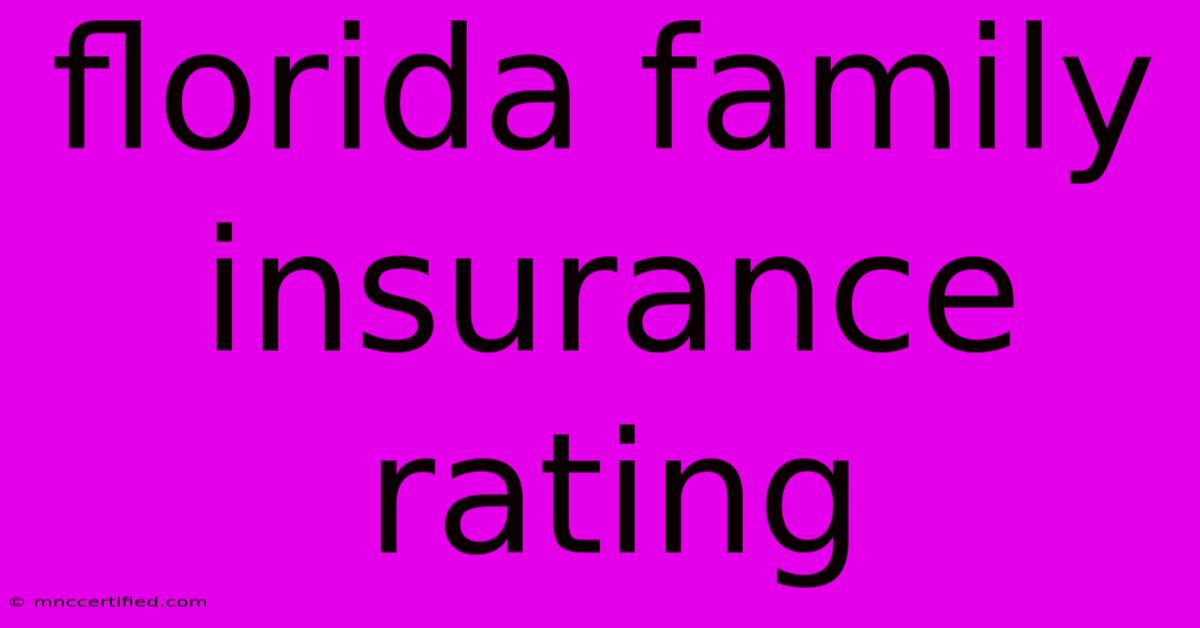Florida Family Insurance Rating

Table of Contents
Decoding Florida Family Insurance Ratings: A Comprehensive Guide
Finding the right home insurance in Florida can feel like navigating a maze. With hurricane season looming and a complex insurance market, understanding Florida family insurance ratings is crucial for securing affordable and adequate coverage. This guide will break down the key factors influencing these ratings, how to interpret them, and how to find the best insurance for your family's needs.
Understanding Florida's Unique Insurance Landscape
Florida's insurance market is notoriously challenging. The high frequency and severity of hurricanes significantly impact premiums. Furthermore, insurance rating is influenced by numerous factors beyond just the risk of natural disasters. These include:
- Location: Coastal properties face higher premiums due to increased hurricane risk. Even within a county, proximity to the coast significantly impacts your rating.
- Home Age and Construction: Older homes with outdated building codes generally receive higher ratings, reflecting a greater vulnerability to damage. Homes built with hurricane-resistant materials, such as impact-resistant windows, can qualify for lower ratings.
- Claims History: Your own claims history, as well as the claims history of your neighborhood, plays a substantial role in your insurance rating. Multiple claims can lead to significantly higher premiums.
- Credit Score: In many cases, your credit score is a factor in determining your insurance premium. A higher credit score typically translates to lower premiums.
- Insurance Company: Different insurance companies employ different rating models, leading to variations in premiums even for similar properties. Therefore, comparing quotes from multiple insurers is essential.
Deciphering Your Insurance Rating: What the Numbers Mean
Your insurance rating isn't a single number; it's a complex calculation resulting in a premium. While you won't receive a simple "good" or "bad" rating, understanding the factors influencing your premium allows you to understand your rating indirectly. A higher premium generally indicates a higher risk assessment by the insurer.
How Insurance Companies Determine Your Rating
Insurance companies use sophisticated algorithms and statistical models to assess risk. They analyze vast datasets including:
- Catastrophe modeling: Predicting potential losses from hurricanes and other natural disasters.
- Loss experience data: Analyzing past claims data to identify high-risk areas and properties.
- Property characteristics: Assessing the age, construction, and location of your home.
- Personal characteristics: Considering your credit score and claims history.
Finding the Best Florida Family Insurance: A Step-by-Step Guide
Finding the right insurance for your family requires diligent research and comparison. Here's a structured approach:
-
Assess Your Needs: Determine the level of coverage you need to adequately protect your home and belongings. Consider factors like replacement cost, liability limits, and additional coverages.
-
Get Multiple Quotes: Contact multiple insurance providers and compare their quotes. Don't solely focus on price; carefully review the coverage details.
-
Understand Your Policy: Thoroughly read your policy to fully understand the terms, conditions, and exclusions.
-
Consider Bundling: Bundling your home and auto insurance with the same provider can often result in significant discounts.
-
Explore Mitigation Options: Implementing hurricane mitigation measures, such as installing impact-resistant windows or strengthening your roof, can potentially lower your insurance rating.
-
Review Annually: Insurance rates can fluctuate. Review your policy annually and consider shopping around for better rates if necessary.
Keywords for Improved SEO
This article utilizes keywords such as: Florida family insurance, Florida home insurance, insurance rating, Florida insurance rates, hurricane insurance Florida, home insurance quotes Florida, best home insurance Florida, cheap home insurance Florida, Florida insurance companies. These keywords are strategically integrated throughout the text to improve search engine optimization without sacrificing readability.
Off-Page SEO Strategies
To further enhance this article's online visibility, consider the following off-page SEO strategies:
- Link Building: Secure high-quality backlinks from relevant websites, such as financial blogs and real estate websites.
- Social Media Promotion: Share the article on relevant social media platforms to increase visibility and engagement.
- Guest Blogging: Contribute articles to other websites in the insurance or finance niche to build your authority and attract backlinks.
By implementing these on-page and off-page SEO strategies, you can significantly improve the article's ranking in search engine results pages (SERPs), making it easier for Florida families to find the information they need to secure affordable and adequate home insurance.

Thank you for visiting our website wich cover about Florida Family Insurance Rating. We hope the information provided has been useful to you. Feel free to contact us if you have any questions or need further assistance. See you next time and dont miss to bookmark.
Featured Posts
-
Florida Bad Faith Insurance Law
Nov 26, 2024
-
Manhattan Life Cancer Insurance
Nov 26, 2024
-
Homeowners Insurance Fort Smith
Nov 26, 2024
-
Dental Narratives For Insurance
Nov 26, 2024
-
Microsoft 365 Down Heres The Update
Nov 26, 2024